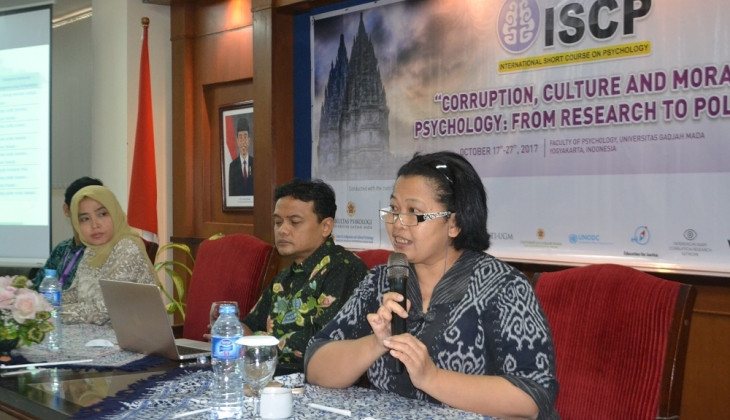Corruption has been determined as an extraordinary crime, even abusing norms and rules stipulated by the state. Despite prevention and firm measures against it, corruption practices are still rampant today. This is because there is the habit and permissiveness that makes corruption hard to eradicate. These issues emerged in the International Short Course on Psychology (ISCP) titled Corruption, Culture and Psychology Morality: from Research to Policy at Faculty of Psychology. The event presented keynote speakers: observer of corruption criminal economy, Dr. Rimawan Pradiptyo, Psychologist from UGM, Dr. Kwartarini Wahyu Yunarti and lecturer, Galang Lufiyanto, M.Psi., Ph.D.
Kwartarini saw that prevention and eradication of corruption can be done by instilling anti-corruption values in children since early age. She said the children should learn the importance of maintaining integrity, commitment, responsibility, ethics and morality as well as respecting difference and diversity."Don’t give our children issues on colonialism, slavery, and divisive policy any longer," said Kwartarini.
Kwartarini revealed corruptive behaviour had rooted deeply since the kingdom era with the people paying offerings to the Kings. After Indonesian Independence, corruption continues still with bribery cases among state officials, bureaucrats and businessmen.
At the same time, said Kwartarini, the young generation lost a role model that they can look up to for them to maintain morality and ethics. In her opinion, if corruption is permissible among people, one may finally end up doing it.
Dr. Rimawan Pradiptyo said those that commit corruption in Indonesia are mostly high-income people, even university graduates. "But corruption knows no age limits, either," he said.
He added the pattern of corruption up to this time had used complicated technique so that it is unable to be uncovered by authorities. If it already comes under surveillance, the perpetrators are not unwilling to abuse their power to prevent investigation process. "They abuse their power to prevent an investigation," he said.
In advanced countries, said Rimawan, corruption prevention is done by strengthening the institution while in developing countries like Indonesia, it is still about law enactment and punishment of perpetrators.
The international course in psychology last until 27 October. Participants came from countries including Pakistan, Australia, Malaysia, the Philippines, Brunei Darussalam, Singapore, China, Ukraina, and Slovakia. The event is hosted by Faculty of Psychology, supported by UGM Centre for Anti-corruption, Faculty of Cultural Sciences, Faculty of Economics and Business, United Nations on Drugs and Crime (UNODC) and Anti-corruption Commission.
Source: Gusti/UGM
